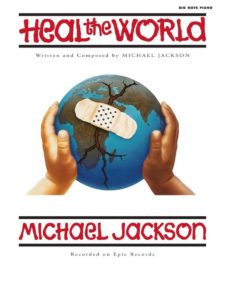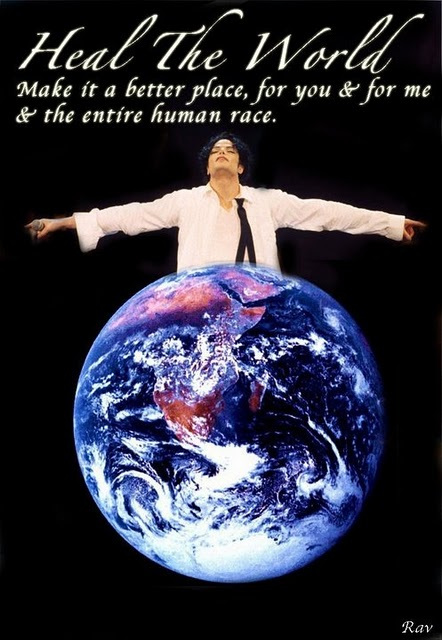“Heal the World” is a song from Michael Jackson’s album Dangerous, released in 1992.
In a 2001 Internet chat with fans, Jackson said that “Heal the World” is the song he was most proud to have created. He also created the Heal the World Foundation, a charitable organization which was designed to improve the lives of children. The organization was also meant to teach children how to help others. This concept of ‘betterment for all’ would become a centerpiece for the Dangerous World Tour. In the documentary Living with Michael Jackson, Jackson said he created the song in his “Giving Tree” at Neverland Ranch.
An ensemble performance of “We Are the World” and “Heal the World” closed Jackson’s memorial service at the Staples Center in Los Angeles on July 7, 2009. The song was performed as rehearsed by Jackson at the venue just weeks earlier, in preparation for his planned “This Is It” concerts in London along with “Dirty Diana”. R&B singer Ciara sang the song as a tribute to Jackson at the 2009 BET Awards.
The song was played at the funeral of James Bulger, and Jackson also donated the song to be used as the anthem for the charity the James Bulger Red Balloon Centre, a school for children to go to if they are being bullied or have learning difficulties.
Reception
The song reached number two in the UK Singles Chart in December 1992, kept off the number one position by Whitney Houston’s “I Will Always Love You”. he World.”
The music video (directed by Joe Pytka) features children living in countries suffering from unrest, especially Burundi. It is also one of only a handful of Michael Jackson’s videos not to feature Jackson himself, the others being “Cry”, “HIStory” and “Man in the Mirror”. Jackson performed the song in the Super Bowl XXVII halftime show with a 35,000 person flash card performance.
[wiki] https://en.wikipedia.org/wiki/Heal_the_World

So much research has looked at the effects of violent music lyrics and video-games on people’s aggressiveness, but what about the effects of media with a positive message? Can songs like Michael Jackson’s Heal the World and Bob Sinclair’s Love Generation change people’s behaviour for the better?
Tobias Greitemeyer says this side of the media-behaviour equation has been neglected before now, but in a series of five studies conducted in Germany and the UK he’s shown that ‘pro-social’ music reduces people’s aggression. What’s more, he’s demonstrated that it appears to do so through its effect on mood and emotion rather than via changes to thoughts and cognition.
Greitemeyer’s general approach was to have half his participants listen to a few pro-social songs, the others listen to neutral songs, and then all of them complete various questionnaires or tasks, depending on the specific experiment.
Further examples of pro-social songs used in the experiments include Michael Jackson and Lionel Richie’s We Are The World (among the biggest selling singles of all time) and U2’s Vertigo. Among the neutral songs used were Michael Jackson’s On The Line and Bob Sinclair’s Rock This Party. Greitemeyer deliberately chose some pro-social and neutral songs by the same artists so as to control for the effects of the actual singer and general style.
Participants who listened to pro-social songs subsequently showed reduced aggressive cognitions – for example they were less likely to complete ambiguous word stems (e.g. ‘schla_’ in German) with violent endings (e.g. ‘schlagen’, to hit), choosing instead more peaceful endings (e.g. ‘schlafen’ to sleep). They also exhibited reduced aggressive mood, being less likely to say they felt angry or irritated.
Most importantly, participants who listened to Heal the World and other pro-social songs were less likely than participants who listened to neutral music to actually be aggressive. This was tested indirectly by having participants evaluate a job candidate. Apparently this is a common measure in the aggression field, with harsh judgements being taken as a sign of indirect aggression


Recent Comments